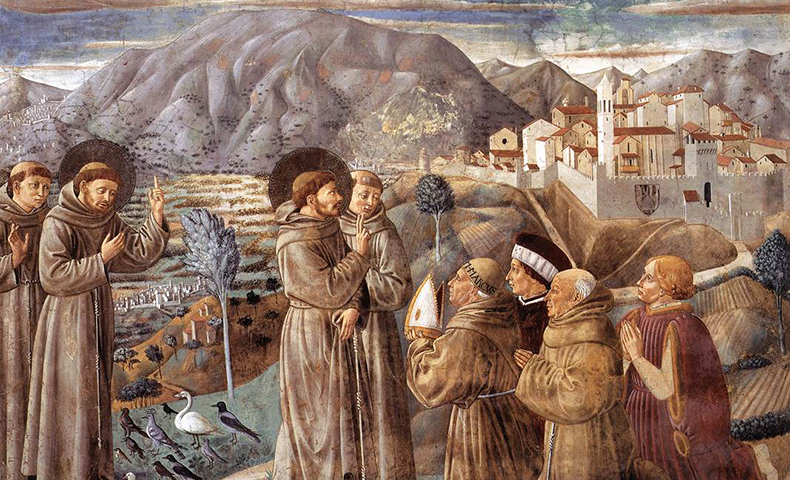Saint Francis of Assisi, Saint of the day for October 4th

(1181 or 1182 - 3 October 1226)
History of St. Francis of Assisi
The patron saint of Italy, Francis of Assisi, was a poor little man who amazed and inspired the Church by taking the Gospel literally, not in a strict and fundamentalist sense, but by actually following everything that Jesus said and did, with joy, without limits, and without a sense of personal importance.
A serious illness led the young Francis to see the emptiness of his playful life as leader of the youth of Assisi. The long and difficult prayer led him to an emptying of himself like that of Christ, culminating in the embrace of a leper he met on the street. It symbolized his complete obedience to what he had heard in the prayer: “Francis! All that you have loved and desired in the flesh it is your duty to despise and hate it, if you want to know my will. And when you have started this, everything that now seems sweet and adorable to you will become intolerable and bitter, but everything that you avoided will turn into great sweetness and immense joy ”.
From the cross in the neglected field chapel of San Damiano, Christ said to him: "Francesco, go out and rebuild my house, because it is about to fall". Francis became the totally poor and humble worker.
He must have suspected a deeper meaning of "building my house". But he would have contented himself with being for the rest of his life the poor "nothing" who actually put brick by brick in abandoned chapels. He renounced all his belongings, even piling up his clothes in front of his earthly father - who asked for the return of Francis' "gifts" to the poor - so that he was totally free to say: "Our Father in Heaven". For a time he was considered a religious fanatic, begging from door to door when he couldn't get money for his job, evoking sadness or disgust in the hearts of his former friends, ridiculed by those who didn't think.
But authenticity will tell. Some people began to realize that this man was indeed trying to be a Christian. He truly believed what Jesus had said: “Announce the kingdom! Have no gold, silver, or copper in your purses, no traveling bag, no sandals, no walking stick ”(Luke 9: 1-3).
Francis' first rule for his followers was a collection of texts from the Gospels. He had no intention of founding an order, but once it started he protected it and accepted all the necessary legal structures to support it. His devotion and loyalty to the Church were absolute and highly exemplary at a time when various reform movements tended to break the unity of the Church.
Francis was torn between a life devoted entirely to prayer and a life of active preaching of the Good News. He decided in favor of the latter, but always returned to solitude when he could. He wanted to be a missionary in Syria or Africa, but in both cases he was prevented from shipwreck and illness. He tried to convert the sultan of Egypt during the fifth crusade.
In the last few years of his relatively short life, he died at age 44, Francis was half blind and seriously ill. Two years before his death he received the stigmata, the real and painful wounds of Christ in his hands, feet and side.
On his deathbed, Francis repeated over and over again the last addition to his Canticle of the Sun: "Be praised, O Lord, for our sister death". He sang Psalm 141, and finally asked his superior for permission to have him take off his clothes when the last hour came so that he could expire lying on the ground naked, in imitation of his Lord.
Reflection
Francis of Assisi was poor only to be like Christ. He recognized creation as another manifestation of God's beauty. In 1979 he was named patron of ecology. He did a great penance, apologizing to the "brother body" later in life, in order to be completely disciplined by God's will. Francis' poverty had a sister, humility, by which he meant total dependence on the good Lord But all this was, so to speak, preliminary to the heart of his spirituality: living the evangelical life, summed up in the charity of Jesus and perfectly expressed in the Eucharist.